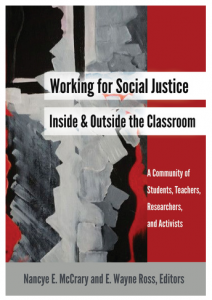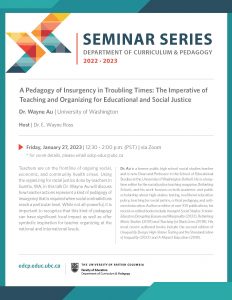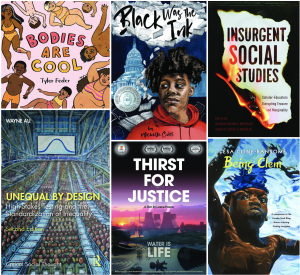
I am pleased to announce a new book just published by Peter Lang, Working for Social Justice Inside and Outside the Classroom: A Community of Students, Teachers, Researchers, and Activists, which I co-edited.
Working for Social Justice Inside and Outside the Classroom delivers critical counter-narratives aimed at resisting the insatiable greed of a few and supporting a common good for most. The book reflects the efforts of a hopeful community, the Rouge Forum, which has been working against perpetual war, corporate education reform, the destruction of our natural environment, increasing poverty, and social inequalities as they fight to preserve democratic ideals in a just and sustainable world. Written teachers, researchers, and activists, this collection is a tapestry of social justice issues woven in and out of formal and informal education.
The Rouge Forum has endured for two decades, a group of educators, students, parents, organizers, and activists who persist in working for social justice, democratic education and a common good. Founded by social education teachers, scholars, and activists, the Rouge Forum moves like waves that, once set in motion, are unstoppable. This remarkably inclusive community has been sustained with hundreds of thousands of visitors to the Rouge Forum website, annual conferences held throughout the United States and Canada, and many of the original founders continuing to ride the waves of change.
The Rouge Forum is uniquely inclusive. Educators, scholars, students, writers, union organizers, artists, and many more gather each year for dialogic interaction and learning together. Membership crosses cultural, national, racial, and class boundaries in the struggle for a just and sustainable world.
Rouge Forum conferences aim to foster dialogue among participants rather than stand-and-deliver speeches. Panel and roundtable discussions are encouraged. As one student said after presenting on a panel at the 2014 Denver Conference, “As we went one by one, you could tell that our confidence continued to rise. When we completed our panel, the crowd kept the conversation going with questions …about our ideas…on how to have dialogic discussions and [build] communities….” She continued saying that the participants were not asking questions about what they knew, how much they had prepared for their panel presentation, instead they wanted to know what those students thought. She ended by saying “…this experience was one for the books.”
This book was written for those who fight for democratic ideals and work against perpetual war, the destruction of our natural environment, and increasing poverty and social inequalities. As the world watches the skewed mass media portrayal of the 99%, the people of the Rouge Forum stand together to delivering a counter-narrative.
Contents:
Nancye McCrary & E. Wayne Ross: Working for Social Justice Inside and Outside the Classroom: A Community of Teachers, Researchers, and Activists
Nancye McCrary: The Last Teacher
Staughton Lynd: What Is to Be done?
Susan Ohanian: Against Obedience
Alan Singer & Eustace Thompson: Pearson, Inc.: Slashing Away at Hercules’ Hydra
Faith Agostinone-Wilson: Relation of Theory and Research to Practice in Social Justice Education – On the Urgency and Relevance of Research for Marxists
Four Arrows & Darcia Narvaez: Reclaiming Our Indigenous Worldview: A More Authentic Baseline for Social/Ecological Justice Work in Education
Rich Gibson: Why It Is Possible and Imperative to Teach Capital, Empire, and Revolution – and How.
Dave Hill: Class Struggle and Education: Neoliberalism, (Neo)conservatism, and the Capitalist Assault on Public Education
Doug Selwyn: Social Justice in the Classroom? It Would Be a Good Idea
Patrick Shannon: Poverty, Politics, and Reading Education in the United States.
Glenabah Martinez: Counter-Narratives in State History: The 100 Years of State and Federal Policy Curriculum Project
E. Wayne Ross: Broadening the Circle of Critical Pedagogy
Leah Bayens: Social Justice Education Outside the Classroom: «Putting First Things First»: Obligation and Affection in Ecological Agrarian Education.
Tara M. Tuttle: «Barely in the Front Door» but Beyond the Ivory Tower: Women’s and Gender Studies Pedagogy Outside the Classroom
Paul Street: Our Pass-Fail Moment: Livable Ecology, Capitalism, Occupy, and What Is to Be Done
Brad J. Porfilio & Michael Watz: Youth-Led Organizations, the Arts, and the 411 Initiative for Change in Canada: Critical Pedagogy for the 21st Century.
Working for Social Justice Inside and Outside the Classroom, is the second book published in the Peter Lang book series Social Justice Across Contexts in Education.
Read the read the preface and introduction here.


